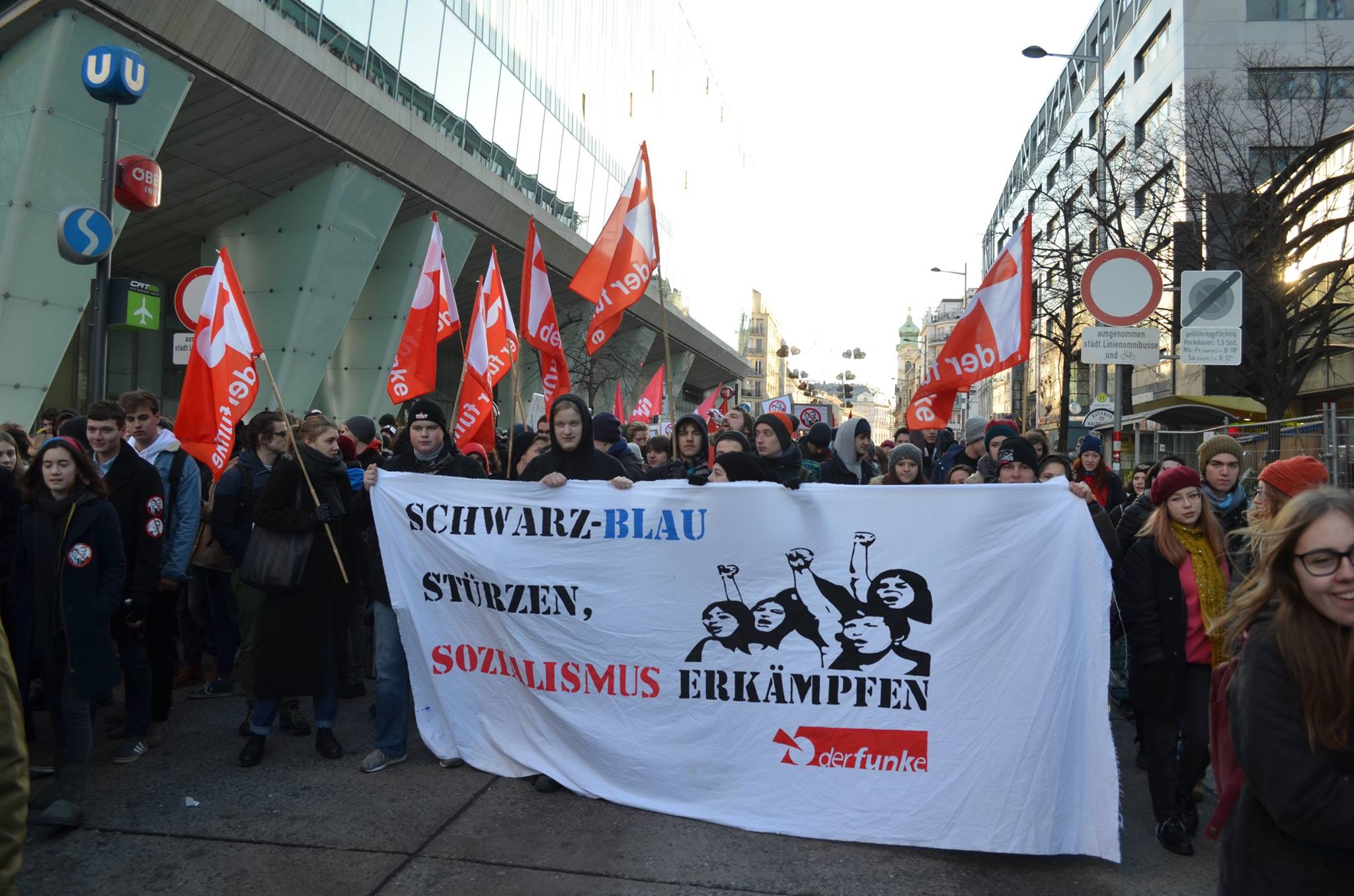Under the heckling of 10,000 demonstrators on the morning of Monday 18 December, a new right-wing government was sworn in at Vienna, Austria. The coalition of the right-wing, Conservative Party (ÖVP) and the right-wing Freedom party (FPÖ) took two months to agree on a 182-page coalition program, which outlines the policy of the bourgeois block government for the next five years and (so they say) for the coming decade.
This government has a comfortable majority of 113 members of parliament out of 183 seats in total. It can also count on the support of the liberal NEOS-party, a ‘moderate’ split from the Conservative Party, which gives the bourgeois parties for the first time a two-thirds majority in the first chamber, and thus the ability to change constitutional laws without the need to find a compromise with Social Democracy. The outcome of the 15 October election saw bubbly cracked open in the management boards and interested groups of capital, and this celebratory mood found a new zenith with the swearing in of the new cabinet under Prime Minister Sebastian Kurz of the Conservative Party.
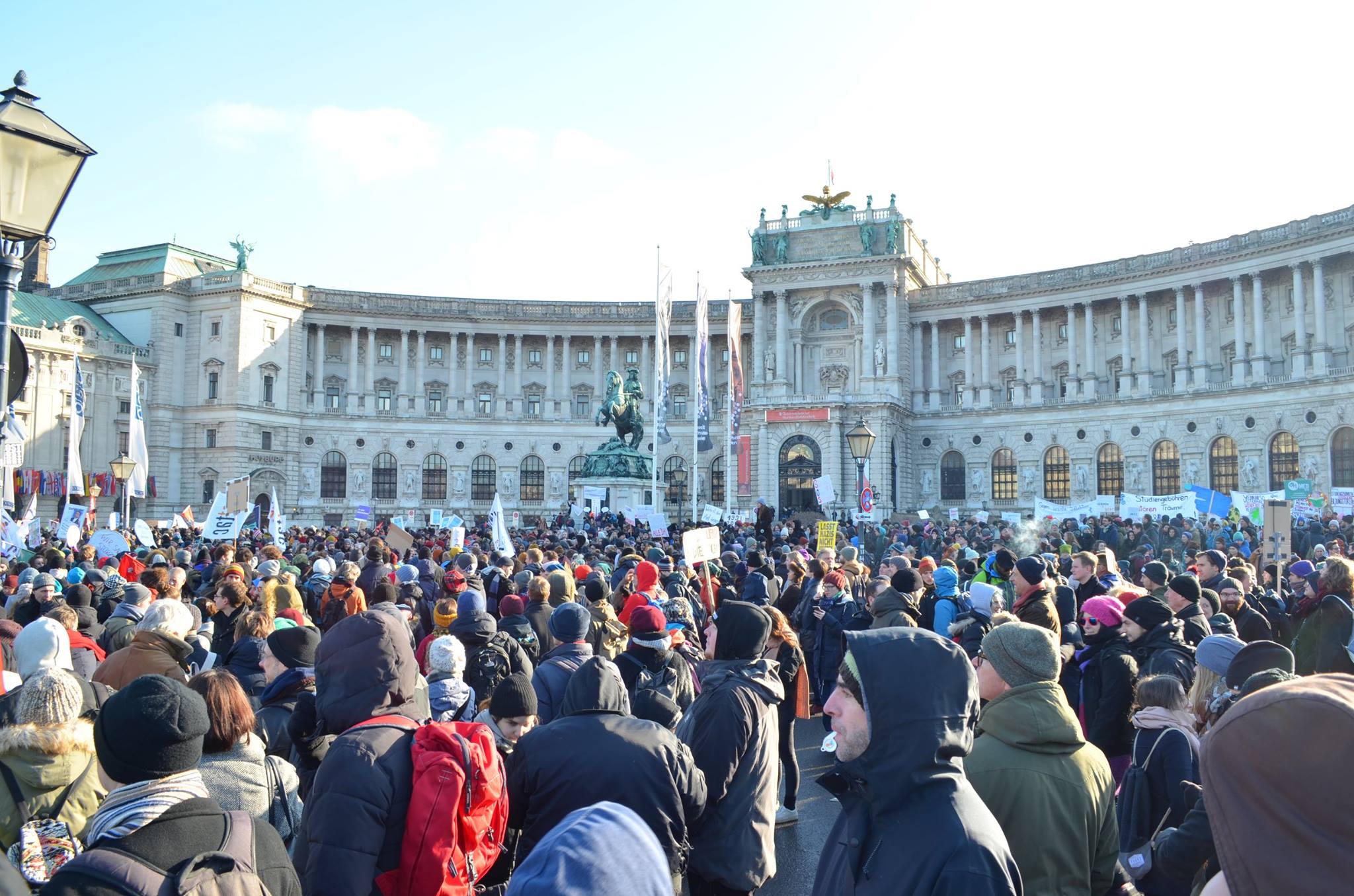 Huge demonstrations have been organised all over the country / Image: own work
Huge demonstrations have been organised all over the country / Image: own work
The nature of political crisis and polarisation in Austria
The sweeping victory of ‘young star’ Sebastian Kurz, in fact the most long-standing member of various governments since 2007, in the general election of 15 October requires a clarification on the nature of polarisation in the country.
Kurz took over leadership of the Conservative Party in a coup in May of 2017. Before he and his well-organised clique sabotaged the standing party leader Mitterlehner and the grand-coalition government with the social democrats for months. The change in leadership implied a right-wing shift in the party, a defeat for the class-collaborationist wing of the bourgeois against the more radical layers who wished to form a bourgeois block to push back the involvement of organised labour via SPÖ and trade unions in state apparatus.
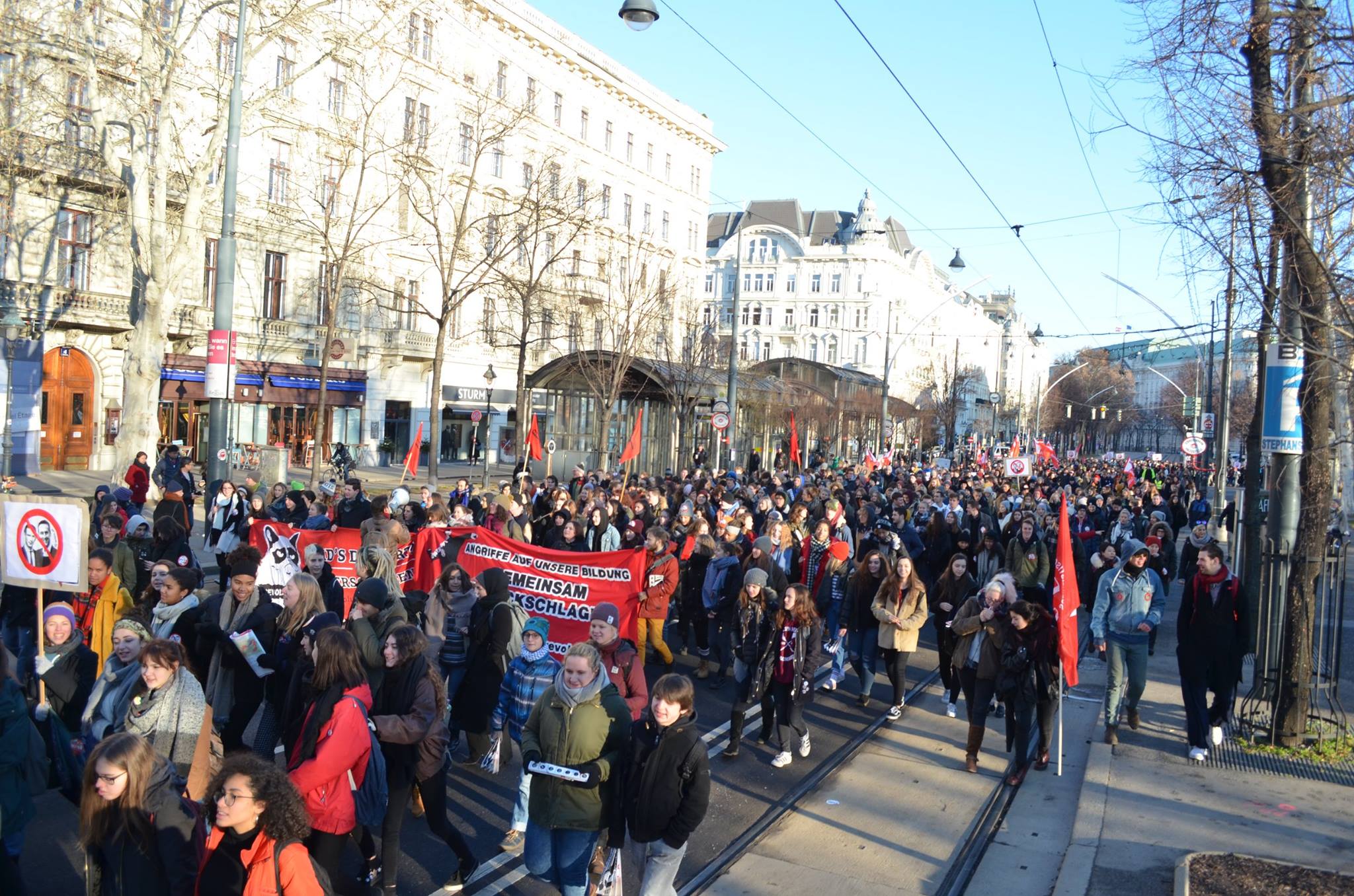 The youth have formed the most radical contingent of the 'resistance' / Image: own work
The youth have formed the most radical contingent of the 'resistance' / Image: own work
In reality the old grand-coalition was paralysed for years, a whole layer of politicians was forced to step down (SPÖ chancellor Faymann in May 2016, Conservative leader Mitterlehner in May 2017 and in the same month also the leader of the Green Party) revealing a looming political crisis and heavy tensions. The whole process of the political crisis was delayed by the political and technical problems in the election of a new head of state, a process that dragged all over the year of 2016.
The underlying reason for the tensions in the political caste and the feeling of malaise in society is the aftermath of the 2008 crisis. A grand-coalition was formed to deal with the ‘big issues’. In fact, the only thing that was fixed was the state funded bank bailouts, which has landed the tax payer with a €20bn bill so far.
The sluggish recovery lead to stagnating and falling incomes for the working class and a hike in unemployment, which peaked last winter at half-a-million out of work. At the same time there has been a permanent hike in prices, mainly in food and rent.
All the major channels for political and economic protest were closed for more than a decade by the grand-coalition and institutionalised class collaboration, creating a bad mood in all strata of society.
The bourgeois, mainly the industrialists, got nervous because of the sinking production costs in Southern Europe and Germany, fearing their competitiveness on the stagnating European markets. In the absence of big workers’ protests since 2003 and a yearlong ebb in the youth movement they got big headed and forgot that the ritualised class collaboration only delayed the counter reforms they needed to have to increase their share of profit.
In the working class the mood was not better either. The links between the unions, the shop steward committees and the workers alike were loosened as individuals sought individual solutions to their problems, as a result of the paralysation onto the tops.
The idea of a radical attack on the working class never left the minds of the bourgeoisie. It mainly found an expression in sectors of the industrials who wished to openly attack organised labour, which led to a strike movement in the metal workers sector in 2011. Back then the situation was saved by a joint intervention of the bosses of TUC and the Economic chamber, to the fury of the metal-industrialists who wanted to teach the labour movement a lesson: although the outcome of the spat was far from a clear win for them.
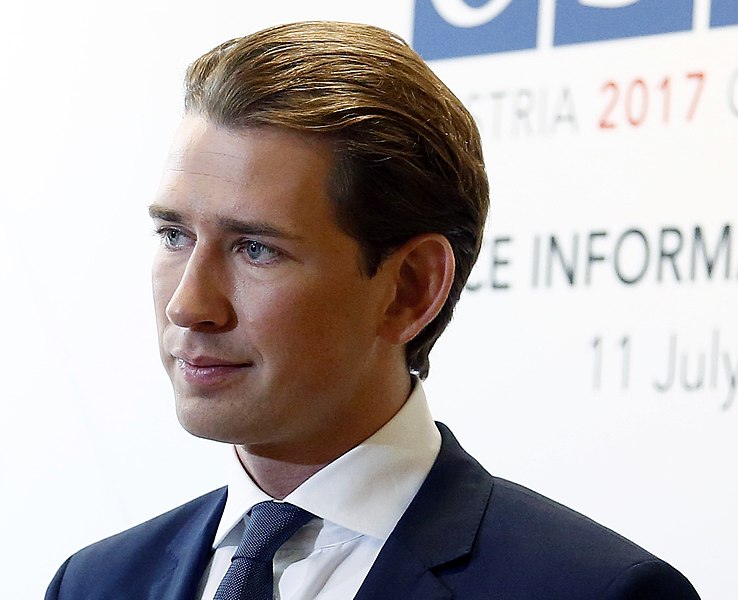 Sebastian Kurz / Image: OSZE 2017 Mauerbach
Sebastian Kurz / Image: OSZE 2017 Mauerbach
The will to attack and push back labour found more and more political expression in the Conservative Party. Kurz was chosen as the figurehead for this wing. They correctly sensed he was a characterless poster boy, who stands for nothing but his prestige: they knew his program could be written by anyone who pays the bill. It was the major financial and industrial group, the Raiffeisen-group, that financed his political career and provided him with favourable media coverage through its dominating corporate news outlets. He was carefully protected from any bad news over the years.
His big moment arrived during the refugee crisis of summer 2015. From one day to the next, the liberal poster boy Kurz switched to a bloodthirsty, racist saviour of homeland who openly stated the need to drown the refugees in the Mediterranean. He used his contacts with shady Balkan politicians to “close the Balkan route” and was celebrated by Boulevard as the saviour of the country. A defiant anti-Merkel stand also helped to shape his demagogy, in a country that historically suffers from an inferiority complex towards its big neighbour Germany.
As a representative of the Ministry of Foreign affairs and Integration (of migrants into Austrian society) he used the so-called crisis to stir up state-orchestrated racism, mainly against Muslims. It was revealed, for example, that he paid off a professor at the University Vienna to produce a fake study on so called parallel societies in the kindergartens of Vienna. In the absence of a terrorist attack, the Boulevard media waxed lyrical about security problems everywhere, portraying Vienna as a city devastated by migrant hordes of thieves, violators and brutes of all sorts.
Kurz demagogically stirred and politically profited from this climate of his own making. It was clear that with his true program of cuts and attacks on living standards he could not win the election. However, class collaboration and falling living standards created a mood of anger in society that then was demagogically directed towards migration.
This analysis is not the product of the superior understanding of the Marxists. Sebastian Kurz and his boys themselves planned their political coups on this understanding. In a leaked document, which contains a detailed plan for seizing power within the Conservative Party, an outline of a winning electoral strategy, and planned cuts and removal of government personnel, we can read:
“The mood in the electorate is characterised by insecurity, a fear of falls in living standards (work, education, wealth…), feelings of envy, as one half of society lives on the expense of the other (…) sullenness towards the system, a mood of impasse, we cannot go on like this, the system reached its limit: hatred towards the old parties, distrust for the elites, low opinion of the system à a lack of faith that the system can solve the problems in a long run. Mood = Mood for a change (…) at this time there is instability in Europe, despite an upswing in economy.”
Based on this correct understanding of the situation, Kurz demagogically turned away the anti-elite mood into an anti-migration mood, scapegoating immigrants for the ills of society. This is the classical function of racism, which found a real master in the new Prime Minister.
It was the combination of an ever-shrinking base of traditional well-off voters, plus an influx of the losers of the last decade, that swept ÖVP into the first place in the election. The Social Democrats came second, as they would only could win optimistic voters (mainly old people), third place went to FPÖ, who only got pessimists onto the ballot: in that 59 percent of blue collar gave a vote to the nationalists. The Greens dropped out of parliament after 20 years.
It is important to note that the deep polarisation in society is not along class lines, but along attitudes towards migration. The right wing could galvanise around an anti-migration mood, which gave them a comfortable majority in parliament. This was only made possible by the class-collaboration of labour and TU-leaders, who found no measure to stop the sliding living standards in recent years. Working-class identity is a cultural phenomenon but lacks any policy of action. The burden of solving problems, mainly ever-increasing work pressure, has been left to each individual.
But even before this government sets to work, the propagandists of the FPÖ (the Conservatives have a very small voters base in the industrial proletariat) are shutting up in the factories, to the point they are starting to claim they never called for a vote for the nationalists. This government was not only sworn in while facing demonstrations in Vienna (10,000), Graz (800), Innsbruck (2,000), Linz (1,500 and 4,000), Salzburg (500), but also a shift in the political mood in the fabric of the country and a looming movement in the schools and universities.
Government program
The program of the government is clearly written by the major interest groups of capital. A short list reads as follows:
- The central issue is push back against labour organisations, starting from the government but also against collective bargaining, labour institutions (the Labour Chamber, a corporatist state institution controlled by trade unions, a result of the Revolution of 1918) and legal powers (for example in social security insurance). The reintroduction of a 12- hour day and ‘de-bureaucratisation’ of work security (i.e. attacks on terms and conditions) are other focal points.
- In the housing market the landlords should have more rights than tenants in all aspects, rents in Vienna will increase a 10 percent, social housing is to be squeezed.
- Social security for the poorest is being cut, increasing the pressure to enlarge and deepen the precarious labour market, which is accompanied by an increasing import of migrant labour bound to all sectors.
- Unemployment security is to be cut.
- University fees are to be reintroduced and the segmentation of education increased. High-schools will have the right to introduce new barriers to vet the entrance of ten years old. Standardised education checks throughout educational careers will begin at the age of three.
- A family will be defined as “the unity of man and woman with children, as the natural cell and glue of a functioning society”. The “natural role” of the woman is described as “educating, nursing, teaching, economy, environmental care and voluntary work”. Tax regulations, child care institutions and so on are to be reshaped along this ideal.
- Social security money will be channelled into the starving financial market in Vienna and more state guaranties for venture capital are to be given out to these parasitic people.
- The main corporate tax shall be halted.
- Internal security will be stepped up, the farmers will get more tax breaks and subventions and state protection against animal rights groups, and passports will be given out to ‘old-Austrians’ and Süd-Tyrolians, which is not only a stupid expression of historic revisionism, but will also nab potentially 300,000 conservative-nationalist voters for the next elections.
- And overall there will be renewed pressure against Islam, which is mentioned no fewer than 21 times.
Resistance!
The slogan of the main movement against the coalition is ‘resistance’. The social democratic organisations have produced this slogan to organise their recovery for new elections, and plan to change the government by putting themselves back into coalition. But this orientation lacks any concrete perspective on how to fight this vicious government and in fact – given the state of the social democracy, led by liberal elements – offers no alternative at all.
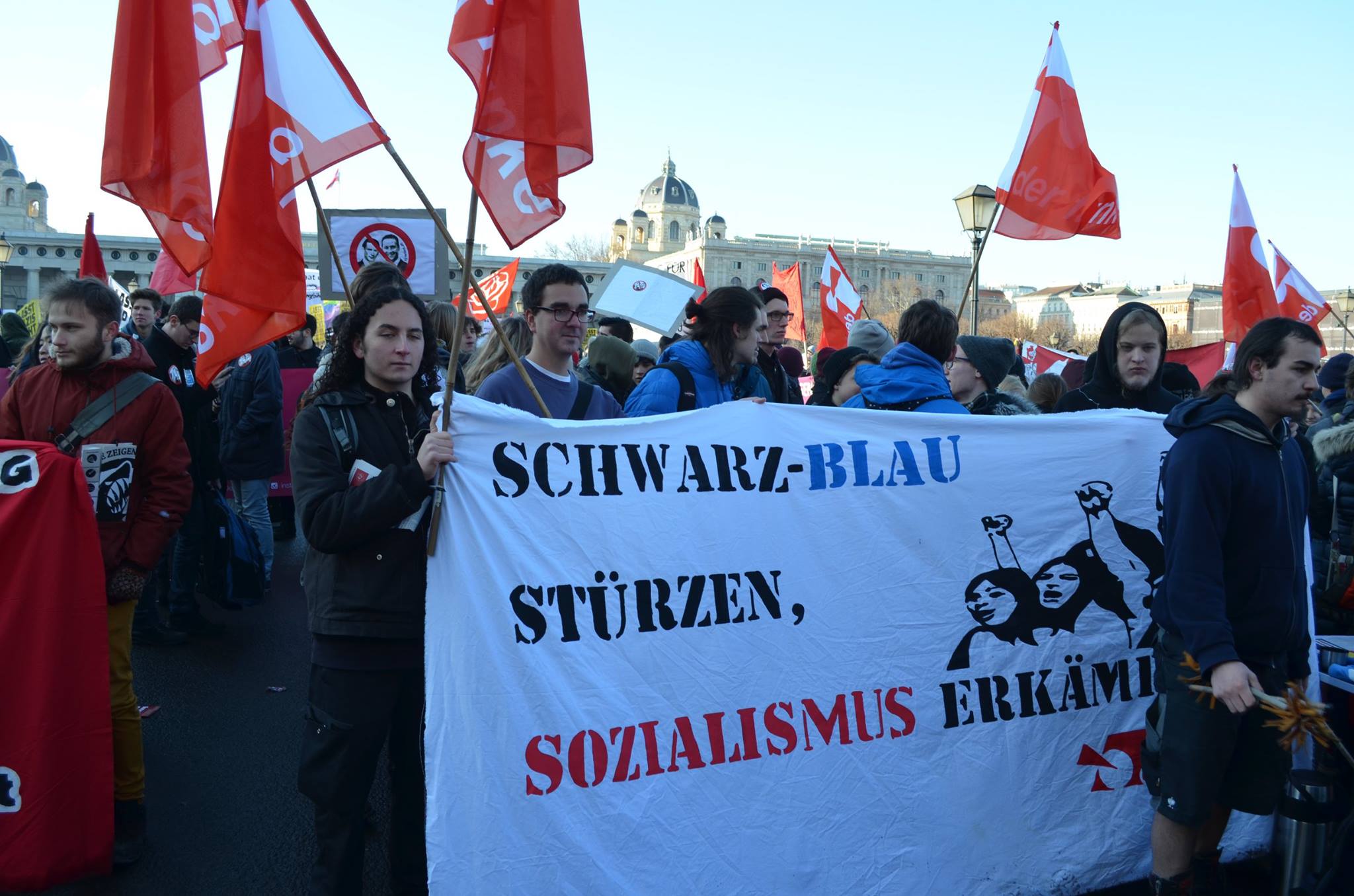 Der Funke comrades at a demo / Image: own work
Der Funke comrades at a demo / Image: own work
The main weakness lies in the leadership of the trade unions. Though TUC president Foglar correctly describes the government as “right wing nationalists”, whose programme is dictated by the industrialists, he insists on “TU political neutrality”. Even to the point he calls on unionists not to participate in the protest movement.
The aim of these reactionary policies is to maintain the process of class-collaboration and state-involvement at all costs. The hope is that, by giving a shoulder to the government, it is possible to bargain away the most vicious elements of the push back against organised labour from state participation.
This hope expresses the political orientation of the labour bureaucracy, that once again represents the most conservative element in the political equation.
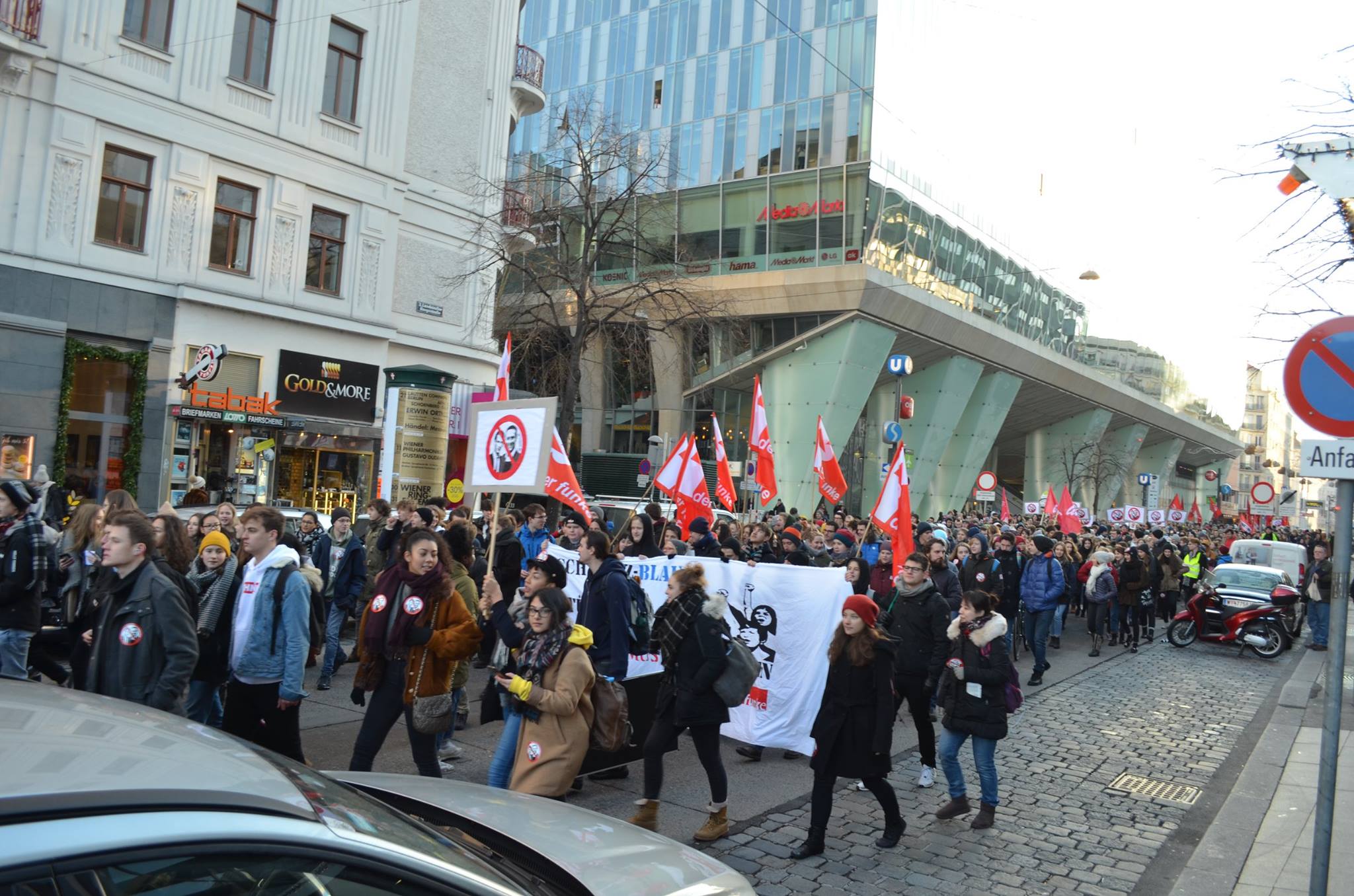 Der Funke in youth bloc / Image: own work
Der Funke in youth bloc / Image: own work
In the short and mid-term this means that the pressure on the individual workers and the isolated shop steward committees will immensely increase. Because the bosses do not wait. Immediately after the bourgeois election victory, in many sectors the collective bargaining was cancelled, and the bosses openly spited labour leaders: giving them teach-ins on changing sexual behaviour instead of talking about work conditions, as happened to stunned metal worker delegates. This government is not just a bourgeois government, but the spearhead of a bourgeois block, that wants to finish off labour participation in governance.
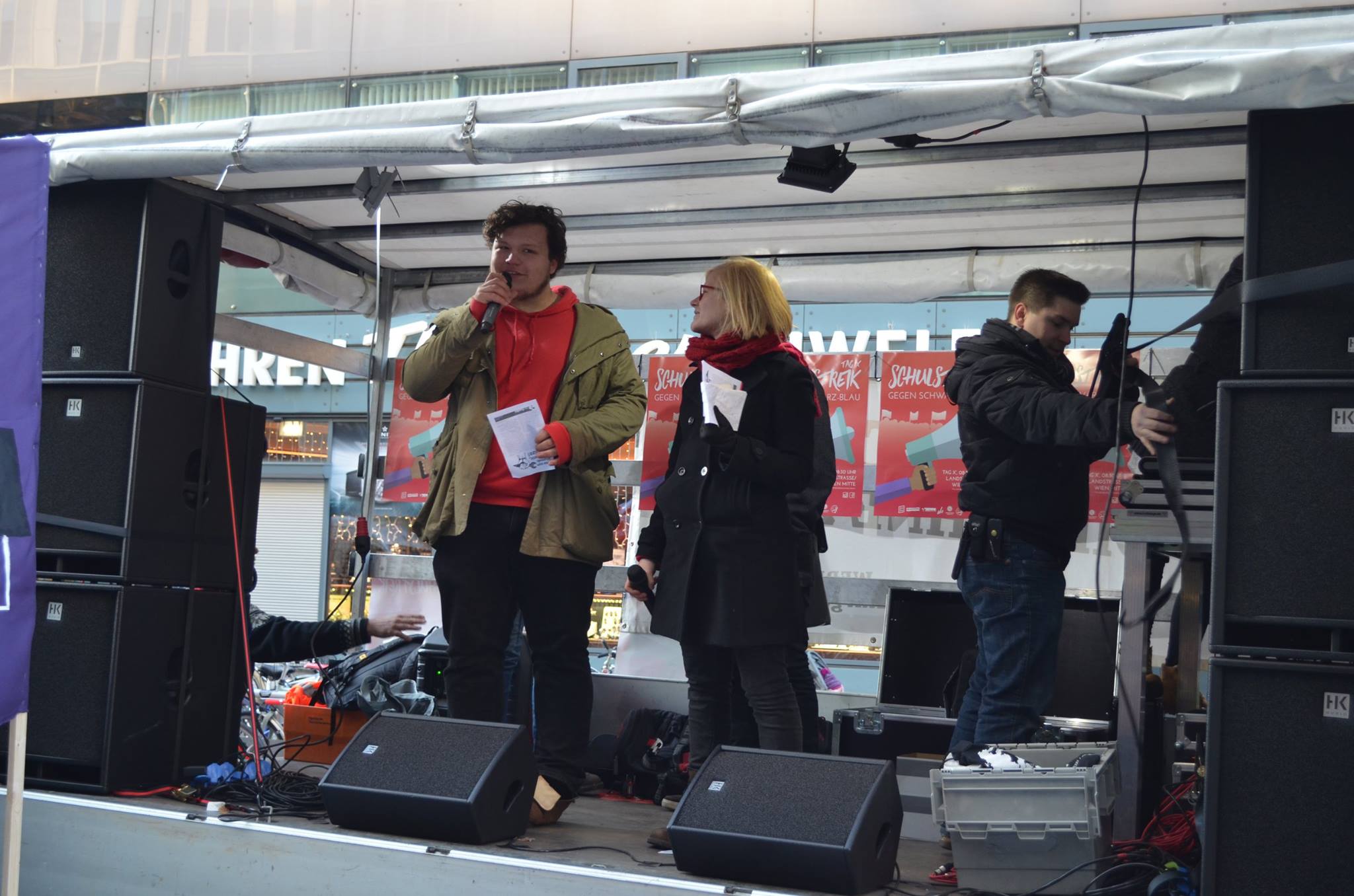 Der Funke comrade speaking at a demo / Image: own work
Der Funke comrade speaking at a demo / Image: own work
But we need to be clear, this government is not fascist, even if very reactionary bastards take office. In their shadow, a rats tail of even worse people and actual fascists reside in the magnificent edifices of imperial Vienna. But liberal and social democratic exaggerations in reality only cover their own political weakness and responsibility for the state of affairs.
The strategy of the bourgeoisie is not to smash labour but to push them back. Learning from the experience of the first bourgeois block government from 2000-2007, which saw the collapse and split of the FPÖ within three years, they are now careful not to provoke the movement. They are avoiding this by the politics of the stick and carrot, at the moment by offering the TUC to bargain for half a year the demolition of the labour chamber. Behind the scenes there is the stick: they will smash the union leaders by law if they organise any form of non-verbal resistance. The labour leadership eagerly agrees to this arrangement, but the real opposition to this treacherous farce is already mobilising.
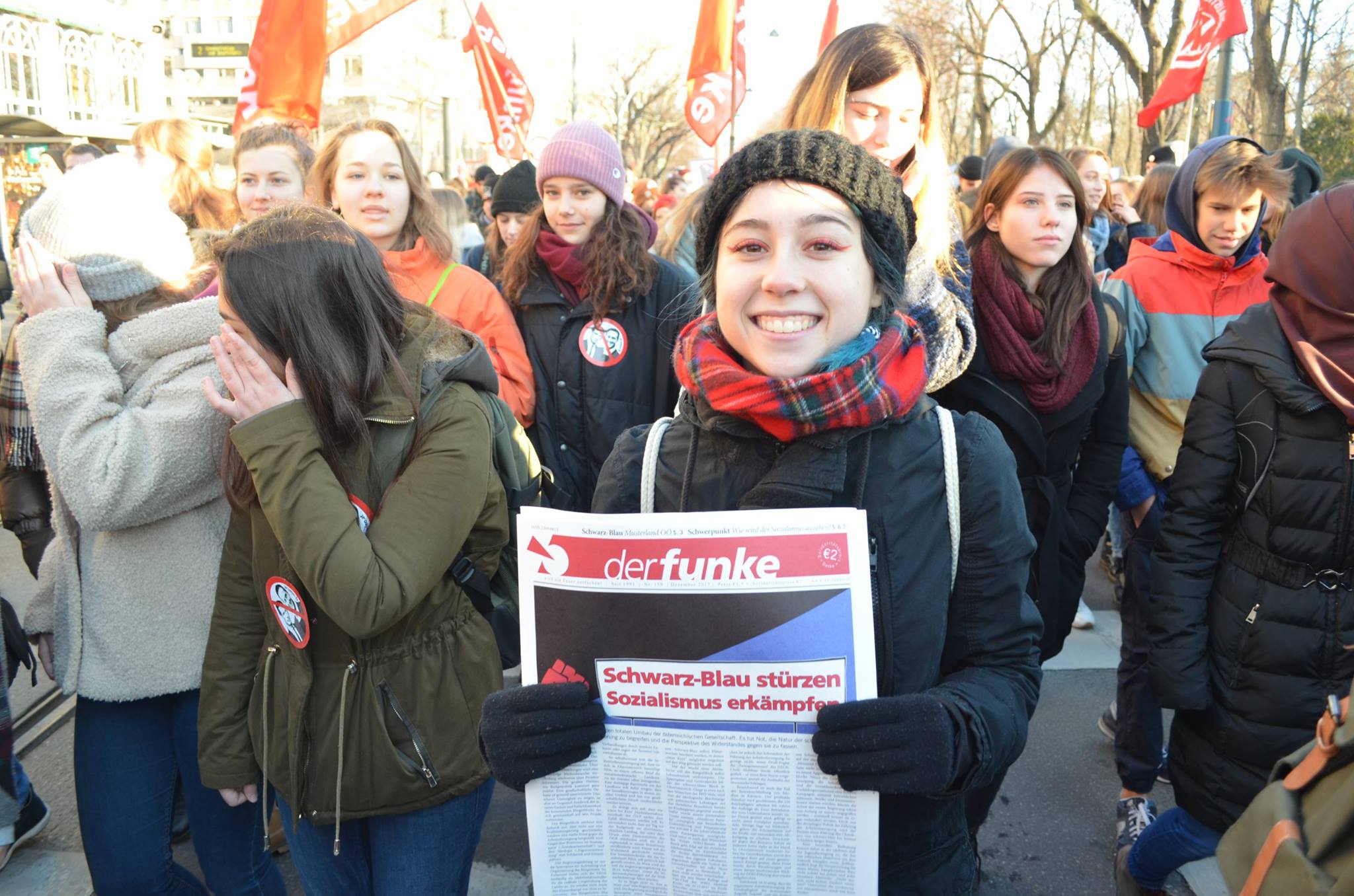 Der Funke comrade selling the paper / Image: own work
Der Funke comrade selling the paper / Image: own work
Also, the provocations over the collective bargaining will go on, and so a situation of permeant tension and debate in the unions and even Social Democratic Party prevails: for now.
We understand that, given the sell-out policies of the tops, it will take time for the labour movement to break through the barriers imposed by the policies of the leadership. But given the general pressure and the aggression of the bosses, at a certain point even spontaneous movements cannot be ruled out in this new era of class struggle.
In order to advance the case of the working class and youth, which can only be based on the general interests of the class and not on the interests of its most privileged sector: the labour bureaucracy, Marxists argue for oppositionist resolutions and leadership candidatures in all labour organisations. Based on the fierce resistance against the bourgeois block we need organisations (the most promising are the youth organisations) and individual leaders that stand for all-out opposition and forming of an uncompromising defensive action on class issues against the bourgeois.
In contrast, the social democratic left (and the left that has broken with social democracy for the moment) are obsessed with “creating structures”, escaping a clash with the bureaucracy and avoiding a serious debate on the perspectives, program and methods for the movement. This is based on one hand on opportunism in the social democratic organisations. But even in the independent elements, there is a mood of defeat and a sense of enduring “a long winter.”
Given this momentous stall in the labour movement, it is the youth that has the leading role in the movement. Thought the aforementioned demonstrations had a general character, involving many workers and left-wingers alike, the most vivid element at the demos were the youth, mainly the school students. About 2,000 school students came out on strike on Monday, and the mood in this sector of the demos was of a completely different character than the rest of the protest. The slogans were the most radical, including slogans about bringing down the government (which the Marxists, who played an important role in the preparation of the strike, introduced) and “one solution – revolution”. This is not only a reflection of youthful energy, but politically the expression of a generation that is unspoiled by past defeats: a heavy burden on the shoulders of even the most militant experienced activists.
In January we will see the process of fermentation at the university will take shape. The introduction of student fees will not go unnoticed by the students, and also here the Marxists will participate right from the start, by adding this question to the upcoming debate on the orientation and method of the students’ struggle.
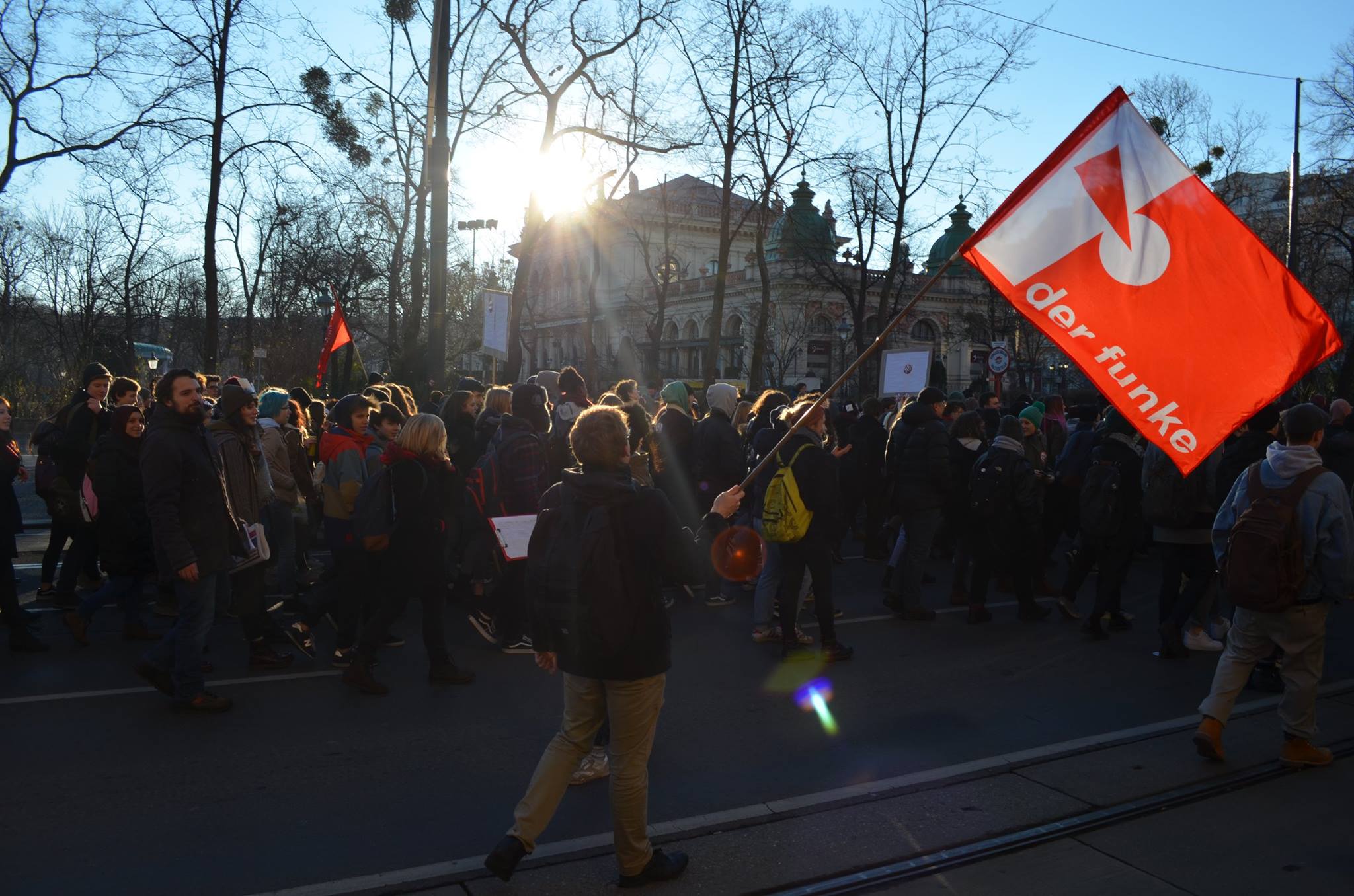 Flying the flag of Marxism / Image: own work
Flying the flag of Marxism / Image: own work
The Marxists of the IMT are the most optimistic political force of working-class and youth in the new scenario. We have a clear understanding of the overall situation, the nature of the bourgeois block and the limitations of the resistance movement, but also the potential weakness of a government that was voted in on lies and forgeries. We also have an understanding of our limited material forces, which in a sense is also the result of the defeats of the past decade. But already in these first days of this government we have proved capable of grasping the ear and take a leading role in the movement. The work of the past years, the orientation towards schools and universities and also the toehold we maintain in the factories and unions has made a difference from the government’s first day. But above all we are maintain a deep understanding and trust in the power of the youth and working class to (as we as we say in our slogan) “bring down the government and struggle for socialism!”

